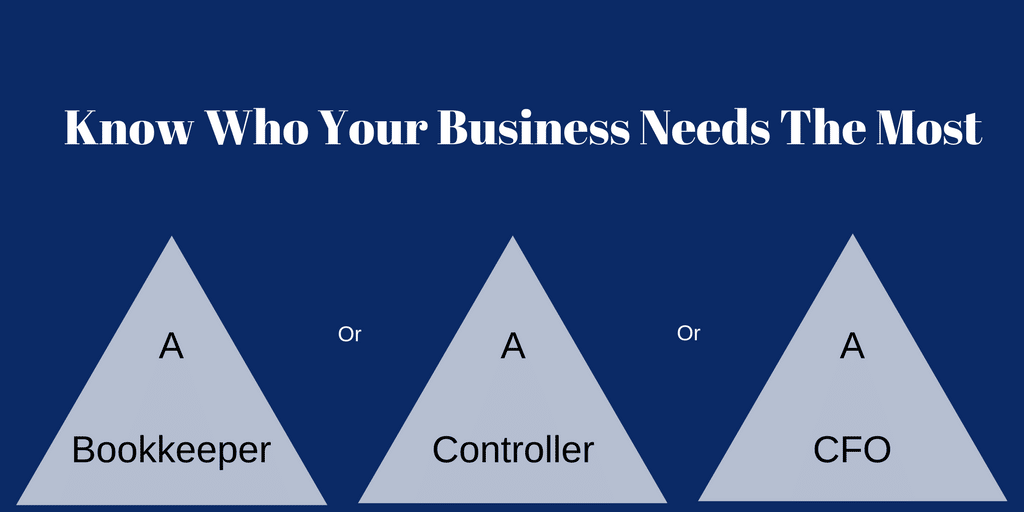A Bookkeeper, Controller or A CFO? Know Who Your Business Needs the Most

A Bookkeeper, Controller or A CFO? Know Who Your Business Needs the Most
A business requires several levels of financial assistance throughout its flow, and you must be familiar with the different levels of financial professionals your business needs in due course of it. Every form of business needs a bookkeeper but a CFO is not required if it is small.
As a business owner if you have a strong knowledge of financial management, taxes & compliance’s, you can skip hiring a bookkeeper during the initial days of your business. The basic fundamental of every business is growth and once your business start growing, the need of Finance professional comes into the picture.
We can broadly categorize these financial executives in three segments and that would be a bookkeeper, a financial controller & a CFO. The general duties of all these three positions are quite different from each other and we have spoken about each one of them in this write-up. This will help you to choose the best among the three based on the level your business is into.
The distinguishes among a bookkeeper, controller and a CFO are mentioned right below.
An Insight Into the Duties of a Bookkeeper
The basic role of a bookkeeper is to process & document business transaction of a Business entity. They must have a wide knowledge of payroll, sales, debits and credits. They keep a tab on the office expenses and monitor the cost of supplies along with other fixed as well as variable costs. A bookkeeper makes sure that the payments are done on time and not only that, they also protect company records.
Bookkeepers are also responsible for identifying fraudulent management and theft and they even take care of employee benefits like insurance and health plans. They make sure to keep a check on compliance issues as well.
What Does a Controller Do?
A controller is more knowledgeable than a bookkeeper and he/she is hired when a business outgrows. Their job is to prepare budgets, special projects, financial statements, business plans and so on. When it comes to bigger companies, a controller supervises accountants, but in smaller companies, the controller himself or herself is the accountant.
A controller looks at risk management and insurance policies and safeguards company assets. They even make reports for internal reviews. They also create plans to meet the specific requirement of a business in order to escalate its growth.
Role of a CFO
A CFO takes care of the entire finance department of a company. He/she analyses the cash flow, income statement and the balance sheet and is also an important part of the company’s financial future. Therefore, a CFO must know how to invest the company’s money and apply critical thinking. A chief financial officer oversees the capital structure of an organization too.
In today’s world, where the business environment has become quite fast-paced, a CFO must take the responsibility of providing leadership to senior level managers of the company. And he/she must be always ready to face challenges and take tough calls, steam operations, forecast market trends and interpret market data.
Your business could grow with time and you would want more people to be a part of it as your business flourishes. Several medium-sized businesses even hire advisers in order to avoid bearing the cost of paying full-time employees. However, you might need a controller to supervise the financial staffs and a CFO to set the financial goals of your company.



